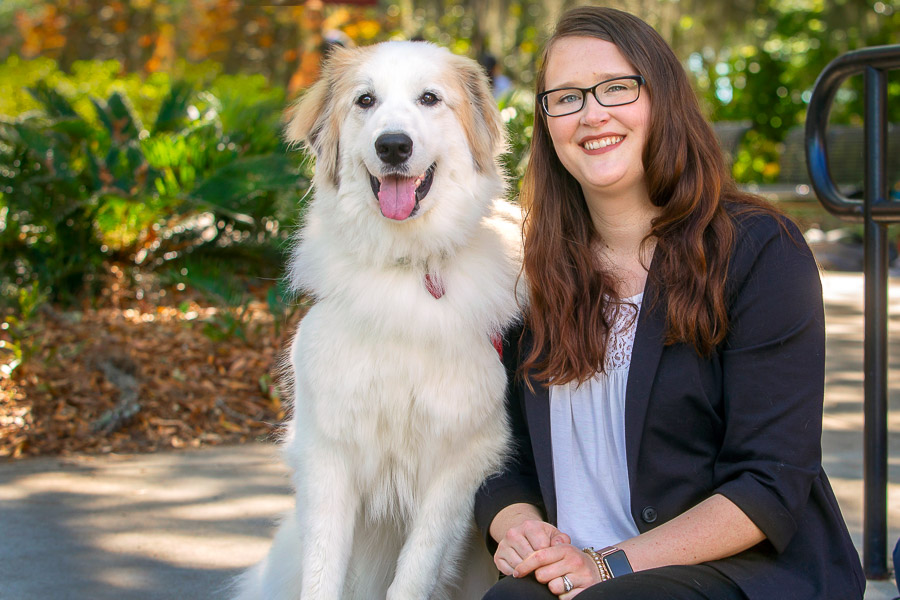
“I hope my efforts help destigmatize the conversation about disabilities and shape academic systems to better serve students with disabilities.”
Florida State University doctoral candidate Ellen Cecil-Lemkin is on a mission to make sure current and future generations of students have a better chance of succeeding in college because of her own journey navigating higher education with a disability.
Cecil-Lemkin, who’s working toward a doctorate in English with a specialization in rhetoric and composition, serves as an ambassador for FSU’s Student Disability Resource Center (SDRC) because she believes so strongly in one of its key goals: offering services to students with “invisible disabilities,” such as anxiety and depression.
“When you ask students about disability, their first thoughts tend to focus on someone using a mobility device, like a wheelchair,” Cecil-Lemkin said. “While some disabled people do use wheelchairs, many more do not have any physical, visible indicators, and those students are eligible for ADA-approved accommodations, such as testing outside of a classroom setting or increased time on exams.”
“The Student Disability Resource Center has made it possible for me to finish my degree.”
Research shows undergraduate students with disabilities are less likely to graduate because academic institutions too often are not set up to accommodate diverse students, Cecil-Lemkin said. She credits Florida State’s SDRC with providing valuable options that have allowed her to stay on track for her doctorate.
“The SDRC has made it possible for me to finish my degree,” she said. “At one point, I was considering withdrawing from my program, but the center offered accommodations that helped me stay in school.”
Cecil-Lemkin wants to raise awareness of FSU’s Student Disability Resource Center in her role as an ambassador for the program. Because in her own experience, finding out about the center happened by chance.
Another graduate student who was registered with the SDRC mentioned how the program had been personally beneficial, and Cecil-Lemkin learned about services that would be beneficial for her.
“I would not have realized the SDRC could help me if a peer hadn’t been vulnerable and open enough to share with me their experiences with the center,” she said. “That’s another reason why I think the center’s ambassador program is so valuable.”
Now, as part of her doctoral research funded by the Gates Foundation, Cecil-Lemkin focuses on developing new ways to structure collaborative writing projects for students to help them succeed. The research also focuses on educating teachers on how to make that happen.
Cecil-Lemkin said her research has given her a broader understanding of how disability can impact students’ performance.
“It’s one thing to read about disability from a scholarly perspective, but it’s a completely different experience to learn from other students and hear their stories,” she said. “In some ways, it solidifies the importance and possible impact of my research.”
Cecil-Lemkin has had another important impact through her assistantship in the English Department. She has worked in the department’s writing center and taught a peer tutoring class. That opportunity to serve as a mentor proved to be a rewarding experience. She confirmed her interest in pursuing a career as an English professor after graduation in the spring of 2020.
Cecil-Lemkin has benefited herself from the mentorship of her professors. One of the main reasons she enrolled at Florida State was because of its “stellar faculty.” Cecil-Lemkin said the English Department is home to preeminent scholars who do an exceptional job of preparing students to land good jobs after graduation.
In addition, she said FSU’s English professors are among the best when it comes to offering encouragement.
“They build structures of support for students because they understand graduate students have lives outside the classroom,” she said. “They are willing to provide in-depth guidance tailored to each person.”
“I want to encourage all students with disabilities, including invisible ones like mental illnesses, to reach out to the SDRC to see what accommodations can help them become more successful academically.”
Another reason Cecil-Lemkin is glad to be working toward a doctorate at FSU is because of her peers. She has connected with other graduate students who have helped her feel a sense of community on campus.
“Sometimes Ph.D. programs can feel cutthroat, but at Florida State I’ve seen a real sense of collaboration and community where students support each other during the program and after graduation,” she said. “That’s impressive and important to me.”
As Cecil-Lemkin prepares to wrap up her education over the next year, she is eager to serve as an SDRC ambassador to raise awareness of the resources available to students with a range of disabilities.
“I want to encourage all students with disabilities, including invisible ones like mental illnesses, to reach out to the SDRC to see what accommodations can help them become more successful academically,” she said. “I hope my efforts will help destigmatize the conversation about disabilities and also shape academic systems to better serve students with disabilities in the future.”




